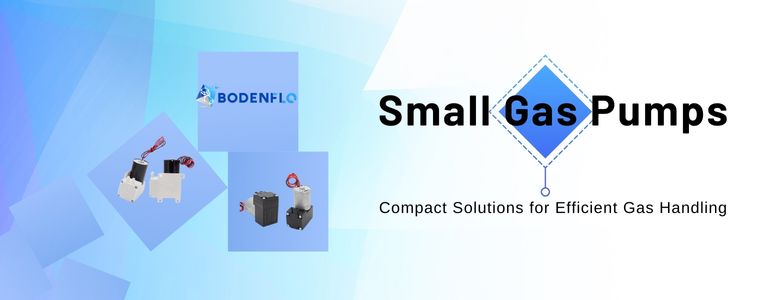
Efficient space management and precision in operations are top priorities in the industrial sector, where handling gases safely and accurately often must be accomplished in confined spaces. Small gas pumps emerge as essential tools in such environments, offering robust performance tailored to compact operational settings. As a project manager at BODENFLO, I’ve collaborated closely with clients across various sectors, witnessing firsthand the pivotal role these compact units play in enhancing operational dynamics.
Small gas pumps are engineered to deliver powerful performance in compact designs, making them indispensable in settings where space is at a premium yet operational precision cannot be compromised. Their precise control over gas flows meets the rigorous demands of critical applications ranging from sophisticated medical devices to complex environmental systems.
Continuing to read will reveal the broad applications of these versatile units and explore the specific benefits that establish small gas pumps as the preferred choice for professionals in diverse industries.
What is a Small Gas Pump?
A small gas pump is a compact device designed to facilitate the precise and controlled transfer of gases in various settings. These pumps utilize advanced diaphragm technology, a preferred method for ensuring accurate gas flow management in confined spaces. The diaphragm mechanism offers superior performance by creating a hermetic seal and enabling fine control over gas movement, making it ideal for critical applications across numerous industries.
Types and Characteristics of Small Gas Pumps:
- Diaphragm-Based Design: The most common type among small gas pumps, diaphragm pumps use a flexible membrane that oscillates to create a vacuum or pressure, allowing for controlled gas flow without direct contact between the moving parts and the gas. This design minimizes wear and extends the pump’s lifespan.
- Compact Design: Their small footprint allows for seamless integration into space-constrained environments, which is particularly beneficial for onboard systems in medical devices or portable analytical equipment.
- Precision Flow Control: Small gas pumps provide exact flow rates crucial for applications requiring stringent volume management, such as in laboratory research or semiconductor manufacturing.
Why Choose Small Gas Pumps?
When it comes to precise and safe gas handling, the choice of equipment can greatly impact the operational effectiveness and safety of a system. Small gas pumps, in particular, offer a myriad of benefits that make them ideal for a range of industrial applications. Their compact design, combined with high efficiency and reliability, addresses the critical needs of industries where space optimization and safety are paramount.
Key Advantages:
- Enhanced Safety: The inherent design of small gas pumps provides a tightly sealed environment that significantly reduces the risk of gas leaks. This is especially crucial when dealing with hazardous or flammable gases, ensuring a safer workplace and compliance with stringent safety standards.
- Cost Efficiency: Small gas pumps are designed not only for performance but also for economy. They consume less energy and require minimal maintenance, which translates into lower operating costs over their lifespan. The reduced energy consumption also supports initiatives for greener operations.
- Durability: With fewer moving parts than traditional pumps, small gas pumps are less susceptible to wear and tear. This durability leads to extended service life and reduced need for frequent replacements, providing long-term reliability and cost savings.
These features make small gas pumps an essential component in industries ranging from healthcare to chemical processing, where precise and efficient gas handling is critical.
Diverse Industrial Applications of Small Gas Pumps
Small gas pumps are invaluable across various sectors due to their adaptability to different environmental and operational demands. These versatile units are engineered to provide precise control and reliability, critical for industries where exact gas handling is essential.
Industry Use Cases:
- Healthcare: Small gas pumps are pivotal in healthcare applications, particularly in medical devices like ventilators where a reliable and contamination-free air supply is essential for patient care. Their ability to provide controlled airflow ensures operational reliability in critical medical settings.
- Environmental Science: These pumps are extensively used in portable field devices for monitoring air quality and detecting pollution levels. Their compact size and reliability make them ideal for environmental scientists who require accurate and dependable equipment in various, often harsh, field conditions.
- Manufacturing: In the manufacturing sector, small gas pumps are crucial for applications that require precise gas dosing. They ensure consistent performance in processes such as chemical mixing or heat treatments, where the exact amount of gas flow directly impacts product quality and process efficiency.
Selection and Implementation Tips for Small Gas Pumps
Selecting the ideal small gas pump for your applications requires a nuanced understanding of both the specific requirements of your systems and the unique features offered by different pump models. Making an informed choice ensures efficiency, longevity, and reliability in your operations.
Selection Criteria:
- Gas Compatibility: It's crucial to ensure that the pump's materials are compatible with the gases it will handle. This is particularly important for gases that are corrosive or reactive, as incompatible materials can degrade, leading to failures and safety hazards.
- Operational Demand: Accurately assessing the volume and pressure needs of your application is essential. Select a pump that can handle your system's demands without overburdening its capacity, which can ensure operational efficiency and extend the pump’s service life.
- Environmental Factors: The operational environment plays a critical role in selecting the right pump. Factors such as temperature fluctuations, humidity levels, and potential exposure to chemicals should guide your choice, as these can significantly affect pump performance and durability.
Ensuring Maintenance and Longevity of Small Gas Pumps
Effective maintenance is crucial for maximizing the operational lifespan and efficiency of small gas pumps. Simple, regular maintenance routines not only extend the life of these pumps but also enhance their performance and reliability, ensuring they continue to meet the needs of precise gas handling applications.
Maintenance Guidelines:
- Routine Inspections: It's essential to periodically inspect the pump for any signs of wear or mechanical stress, especially focusing on critical components like the diaphragm and valves. Early detection of potential issues can prevent more severe problems down the line.
- Cleanliness: Maintaining the cleanliness of the pump, particularly the intake and exhaust ports, is vital. Accumulation of debris can lead to blockages that impair the pump’s efficiency and may cause failures, thus keeping these areas clean ensures consistent performance.
- Professional Servicing: While many maintenance tasks can be handled in-house, annual check-ups performed by certified professionals are recommended. These servicing sessions help ensure that all components are functioning correctly and safely, adhering to industry standards and manufacturer guidelines.
Conclusion
Small gas pumps are pivotal in enhancing the efficiency and precision of gas handling across various industries. Designed to address the challenges of modern operations, these pumps offer compact solutions without compromising performance.
For more details or to discuss how our small gas pumps can benefit your operations, please visit our micro pump select or contact us at info@bodenpump.com.


